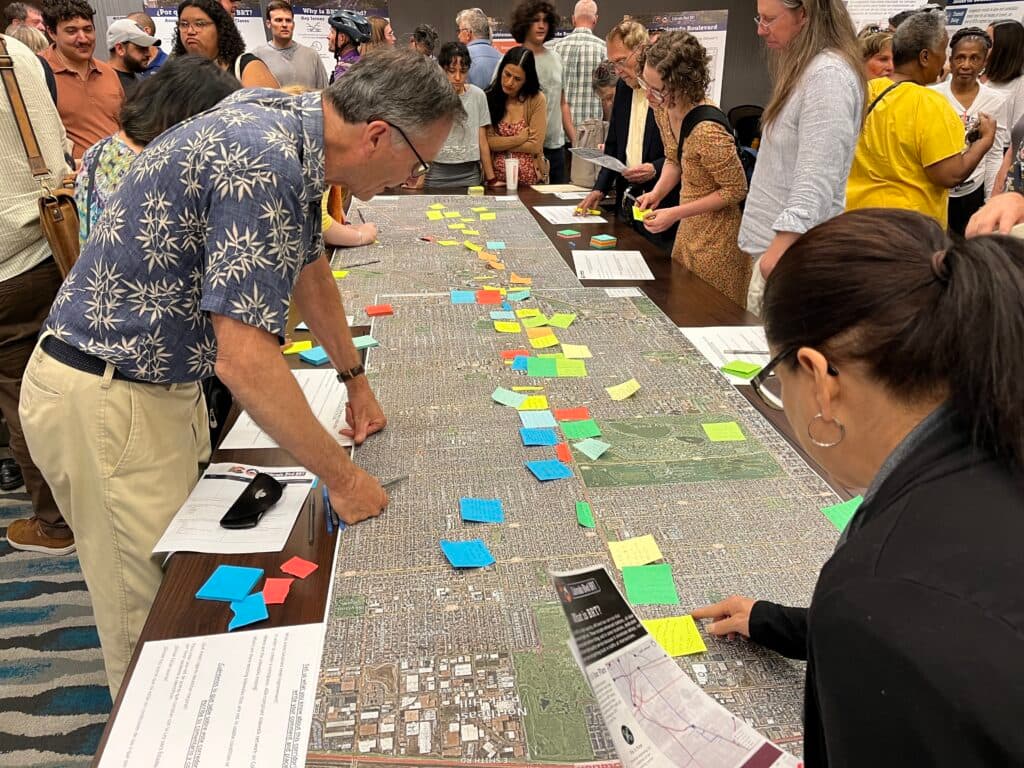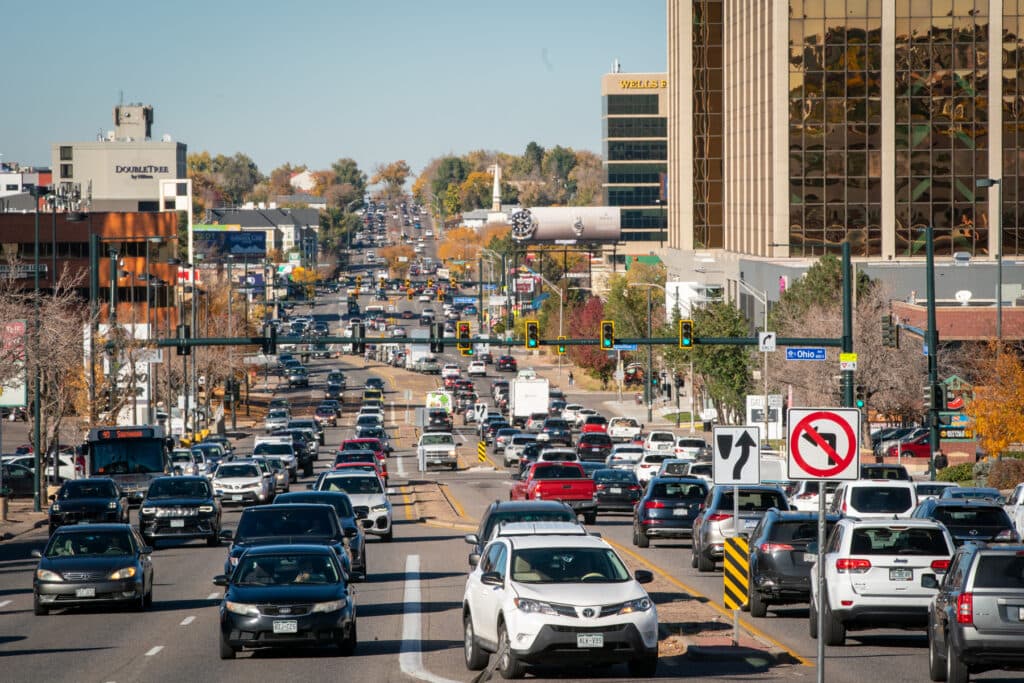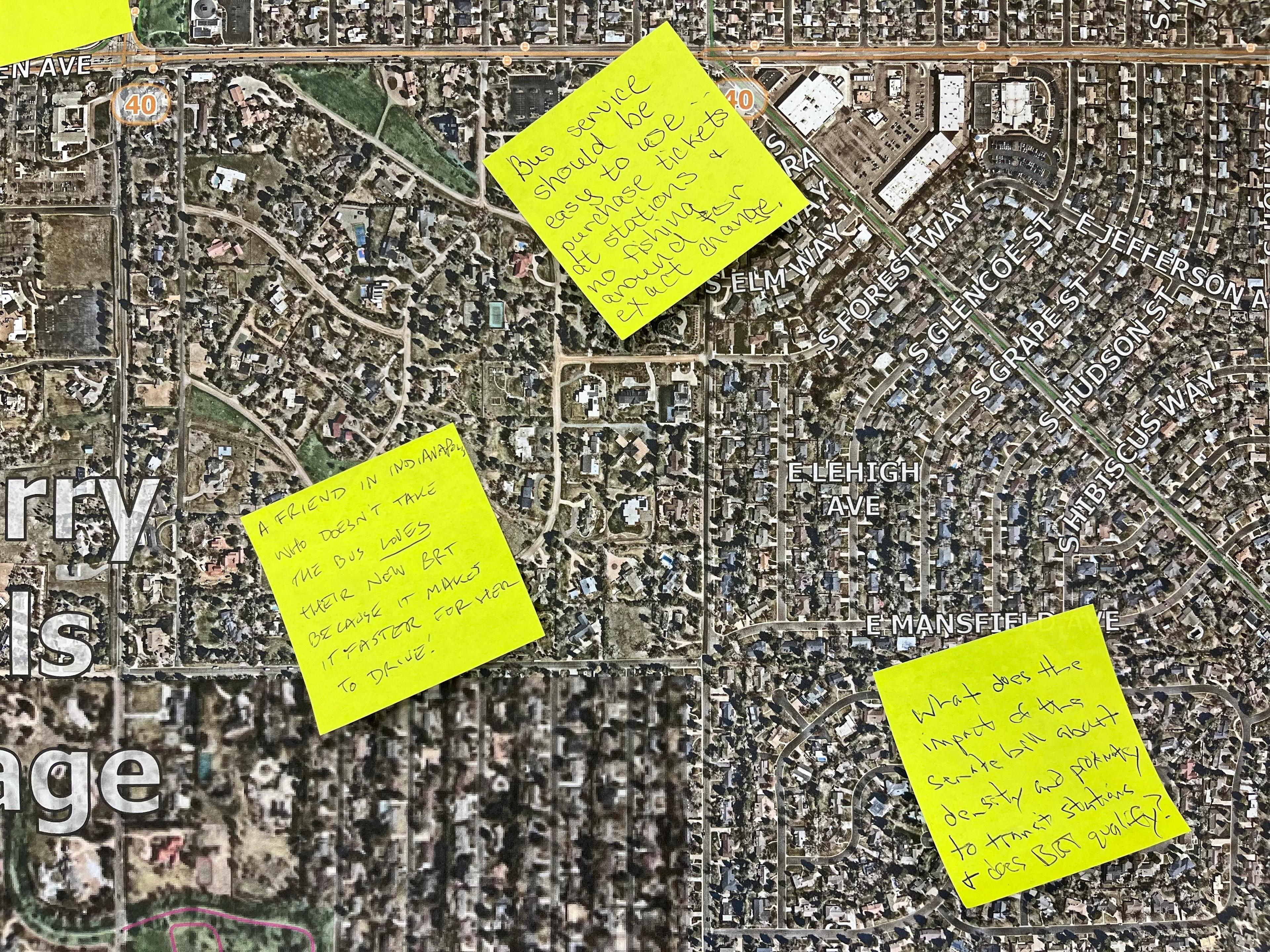A few dozen people packed a hotel conference room on south Colorado Boulevard on Thursday, curious to learn more about what could be the most dramatic change to that road in decades.
The Colorado Department of Transportation is planning a new “bus rapid transit” or BRT line along Colorado Boulevard, running from Interstate 70 southward and past Interstate 25. It’s one of several major planned BRT projects in Denver, and it will feature snazzier bus stations, faster boarding, and other amenities meant to speed up bus service and elevate transit as an alternative to driving.
“We're at the very start of figuring out what it looks like,” said Ryan Noles, CDOT’s bus rapid transit program manager.
One of CDOT’s most crucial decisions will be how and whether to give buses their own lanes to bypass traffic, which could leave less space for cars. CDOT wants to build bus lanes for part of the planned Federal Boulevard BRT line and Denver officials will convert two lanes of East Colfax to bus-only lanes for the Colfax BRT line as well. Noles said a preliminary choice for the Colorado Boulevard design will be made next spring.
Those three new BRT lines — Federal, Colfax and Colorado — are all expected to open by the end of the decade and would mark a significant shift for transit projects in the region. Instead of building rail lines in hard-to-reach areas along highways and freight rail lines, planners are focusing on upgraded buses for some of Denver’s densest corridors. Officials hope the projects will also make the city’s streets safer and help the city and state meet its climate goals.
But they may also be disruptive to how residents live and move. So, Denverite spoke with a handful of residents at the open house on Thursday to learn how they are feeling about the Colorado Boulevard project.

Lorraine Alfini thinks Denver is finally ready to grow up.
She grew up riding subways in New York City, and calls public transportation “one of the greatest inventions in the world.” When she moved to Denver about 50 years ago, it came as a shock that so many people traveled alone by car.
“I had many friends over the years that never got on a bus, and I was like, ‘Are you kidding me? You've never been on a bus?’ I mean, that's like saying you never had your diaper changed,” she said.
She had watched Denver become a more crowded, congested city in recent decades. Now, the Congress Park resident was excited to learn about the plans to improve bus service on Colorado Boulevard.
She doesn’t use the existing local bus line on Colorado very much, and said it needs to come more often — every 10 minutes would be ideal, she said — to become a viable alternative. RTD’s Route 40 bus runs every 15 minutes now, but only until about 7 p.m. Planners haven’t yet said how often BRT service would run.
“People want to stay in their cars because they don't want to depend on something that's not dependable,” Alfinisaid.
Anything that enhances public transportation is a good thing, she added.
“I'm on their side, but there are a lot of people that aren't,” she warned.

One of those opponents is Steve Yobst of Cory-Merrill.
Yobst drove his 2011 Honda Pilot to the open house, he proudly said, adding that any move to narrow Colorado Boulevard would be disastrous.
“If you're going to take two lanes and make it bus rapid transit, that's one-third of Colorado Boulevard that's going to be removed from commerce,” he said. “I don't like that idea. Traffic is bad enough as it is, and the existing RTD buses just get in the way and pollute the environment.”
He was skeptical that enough drivers would ever switch to riding the bus to prevent a traffic meltdown if Colorado lost vehicle lanes.
He also took issue with the fare payment system the BRT line would likely use. Instead of paying on the bus, riders would buy a ticket before boarding to speed up that process.
He alleged that the system would be abused by “homeless vagrants and criminally insane people” who would ride for free.
RTD should focus on getting more riders to pay their fares, he said, adding that any transit improvements shouldn’t slow cars — even in the name of safety.
“Why don't we reduce the speed limit to three miles an hour and maybe even reduce Colorado Boulevard to one lane?” he asked sarcastically. “Think of how many lives we'd save with that.”
Anne and Scott Walker are transit curious.
The Park Hill couple typically drive most places without much second thought. But their son started watching urbanist transportation videos on YouTube and got them talking about walkability, car dominance, and public transit.
“He's frustrated at the layout of Denver,” Scott said. “We were able to go to Europe this spring and he was like, ‘Oh my god, what? We've got it all wrong.’ “
Anne said Colorado Boulevard, which she drives regularly, is her least favorite road in Denver (and she’s not the only person with that opinion). So a transit-focused overhaul is tempting to her.
“If it works, that would be great,” she said.
Scott was skeptical of fears that a narrowed Colorado Boulevard would lead to gridlock. Referencing “induced demand,” the research-supported idea that larger roads attract more drivers and don’t necessarily alleviate congestion, Scott wondered if the same idea could work in reverse.
“I think people will find other ways,” he said. “They're going to use transit, they're going to use bikes, they're going to find other routes.”
(One 2002 study that examined dozens of road narrowings across the world suggests that Scott’s suspicions are correct.)
“And,” he added, “I do think we have such poor solutions to get people around the city that I think we need to expand transit options. And this seems like a good one to do.”
Questions about BRT projects? Send them to [email protected] and we’ll try to answer.

